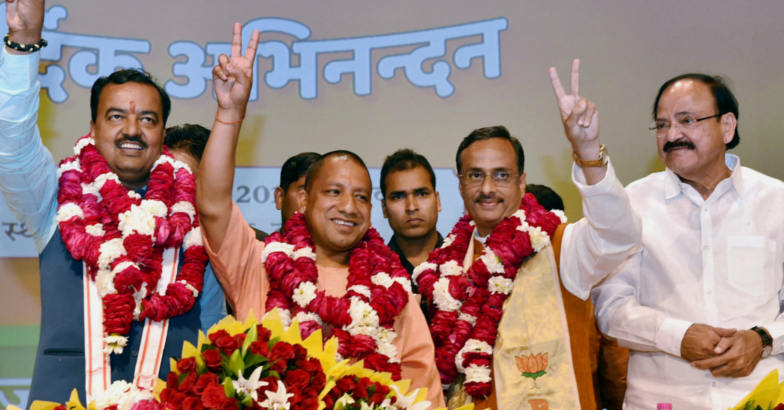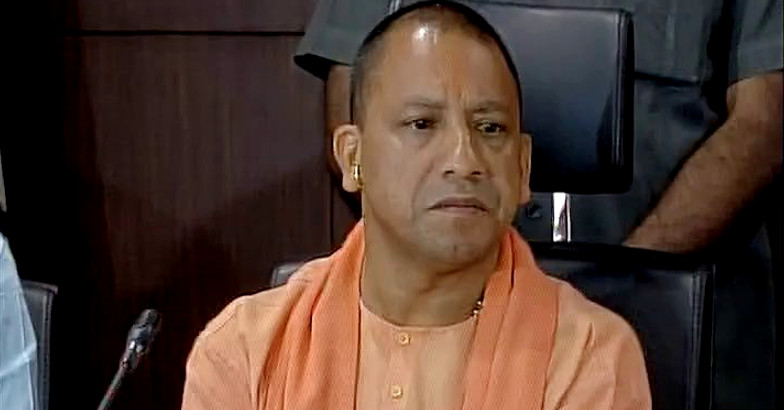Lucknow: Priest-turned-politician Yogi Adityanath, the controversial mascot of hardline Hindutva, was Saturday named as next chief minister of Uttar Pradesh, in a move by the BJP that took many by surprise.
Ending the suspense exactly a week after BJP won a three-fourths majority in the key Hindi heartland state and stormed back to power after 15 years, the 44-year-old five-term MP from Gorakhpur was unanimously elected the BJP legislature party leader at a meeting of the newly elected MLAs.
Adityanath will be sworn in Sunday at a ceremony at Kanshiram Smriti Upvan in Lucknow at 2.15 pm in an event where prime minister Narendra Modi and BJP chief Amit Shah will be present.
Two deputy CMs
State BJP chief Keshav Prasad Maurya, who was himself in contention for the top job besides union minister Manoj Sinha, first announced Adityanath's election amid speculation that the RSS pushed for Yogi's candidature.
Maurya, the MP from Phulpur in Allahabad, will be the deputy chief minister apart from senior BJP leader and Lucknow mayor Dinesh Sharma.

Adityanath, who lacks administrative experience, will be the 21st chief minister of UP and the fourth from the saffron party.
Adityanath to follow Modi
After his election, Adityanath met governor Ram Naik and said he was invited to form the government in UP.
He said he would follow prime minister Modi's slogan 'sab ka saath, sab ka vikas' and ensure all round development of the the country's most populous state.
"I am confident that the state will march on the path of development," he said in his first brief media interaction at the Raj Bhawan.

The Yogi said his efforts would be to provide 'good governance' in the state.
Controversies
The Yogi, who wears 'Hindutva' on his sleeve and has been accused of involvement in quite a few communal incidents in the past, wields considerable influence among the Hindu hardliners.
Adityanath has several criminal cases against him. He has been charged in the past with rioting, attempt to murder, armed with deadly weapon, endangering life or personal safety of others, unlawful assembly, trespassing on burial places and criminal intimidation.
A murder case is going on in the court of CJM, Maharajganj, according to his 2014 election affidavit.
He is not known to enjoy good rapport with the BJP leadership and his elevation has left many puzzled, with political circles abuzz with talk of RSS having prevailed over the party in deciding the new chief minister.
Adityanath has rebelled against his party on several occasions, but because of the sway he holds over the 'Hindu' voters, the BJP apparently could not ignore his 'leadership qualities'.
Often caught in controversy because of his speeches, Adityanath allegedly led a 'purification' drive for conversion of Christians to Hinduism in 2005.
In 2015, he reportedly said those who oppose yoga can leave India and that they should all be drowned. He was arrested for allegedly inciting Gorakhpur riots in 2007.
Adityanath, considered a divisive political figure, enjoys considerable popularity in the state and is known to make provocative statements, be it about Islam or Pakistan.
A strong votary of construction of the Ram temple at the disputed site in Ayodhya, Adityanath drove BJP's Hindutva campaign in the eastern UP in the just concluded assembly polls.
How Adityanath was picked
Union minister M. Venkaiah Naidu and BJP general secretary Bhupendra Yadav were present at the meeting as central observers. Naidu told a press conference that Adityanath's name was proposed by Suresh Khanna, an 8- term MLA, and seconded by 10 others.
Naidu said even after the proposal was made, he asked the 312 newly elected MLAs if they wanted to propose anybody else for the post, but they all backed Adityanath unanimously.
Naidu said that the Yogi then said he needed two deputy CMs to assist him in the gigantic task, following which it was decided that Maurya and Sharma would hold the posts.
'Watershed moment for BJP'
Naidu said, "This is a historic win. This is a watershed moment for BJP...BJP has become a common man's party. UP message is very clear and it is that country wants to move with Modi."
"Mandate is for development, mandate is against corruption, against black money...," he said, with the Yogi by his side.
"This mandate is against caste politics, religious politics and vote bank politics," he said, noting that all the five regions in UP and all communities had overwhelmingly voted for the saffron party.
Earlier, as the meeting was about to begin, an element of surprise gripped the venue when Adityanath reached Lok Bhawan opposite the imposing assembly complex.
Midway through the meeting, Sharma was asked to attend the deliberations. Interestingly, none of the three is a legislator in UP.
As soon as it was decided that the saffron-robed Gorakhpur MP will hold the reins of the state that raised eyebrows, party leaders and MLAs rushed to the dais with sweets and garlands.
Climax to BJP's successful UP campaign
Adityanath's elevation as the chief minister of the volatile state would mark the culmination of an aggressive two-pronged election campaign by the BJP in which PM Modi talked about the party's development agenda, but sundry leaders raked up the issue of Ram temple.
The campaign acquired communal overtones following Modi's 'Kabristan and Shmashan' remark at an election rally.
In the assembly elections, the BJP, riding a Modi wave, stormed to power in Uttar Pradesh, securing a three-fourth majority and demolishing rivals SP-Congress and BSP.
Showing astonishing performance, the BJP got 312 seats in the 403-member Assembly.
Its allies Apna Dal(S) and SBSP bagged nine seats and four seats, respectively, taking the total tally of the combine to 325.
On the other hand, the SP won 47 seats, while its ally the Congress got seven. The BSP won just 19 seats, finishing a dismal third.
The chief minister will have a long list of tasks to accomplish going by BJP's Lok Kalyan Sankalp Patra (Pledge for Peoples Welfare) which promised a host of sops for students, women and farmers, especially free education, laptops and LPG connection in every home.
Former chief ministers
Before Adityanath, Kalyan Singh, Ram Prakash Gupta and Rajnath Singh of BJP have served as UP chief minister.
Kalyan Singh, now Rajasthan Governor, held the high office twice.
Like him, C.B. Gupta, Charan Singh, N.D. Tewari, Mulayam Singh Yadav and Mayawati too have served as chief minister more than once.
Mayawati has the distinction of holding the post four times, while Mulayam was CM thrice.
Mayawati and the outgoing chief minister Akhilesh Yadav have the credit of completing a full five-year term.
Interestingly, the BSP supremo also has the distinction of serving for the shortest term of four months when she first took over the reins in 1995.
In the Congress era of 1960s and 70s, the state had witnessed stalwarts of the likes of G.B. Pant, Sampurnanad, C.B. Gupta, Sucheta Kriplani, TN Singh, Kamalapati Tripathi, Hemvati Nandan Bahuguna, V.P. Singh, Sripati Misra and Vir Bahadur Singh holding the highest office. Of them, Gupta became chief minister three times.
Charan Singh, Ram Naresh Yadav and Banarsi Das served as non-Congress chief ministers with Yadav and Das holding reins of the state during the Janata Party rule.
Charan Singh, who served as CM twice, represented Bhartiya Kranti Dal.

